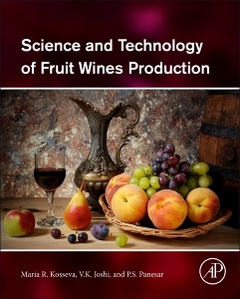Description
Science and Technology of Fruit Wine Production
Coordinators: Kosseva Maria R., Joshi V.K., Panesar P.S.
Language: English
Subject for Science and Technology of Fruit Wine Production:
Keywords
Aging; Agricultural wines; Alcoholic fermentation; Amines; Antioxidants; Aroma; Berry fruit; Bioconversion; Biofuels; Biorefinery; Carbamate; Carbon dioxide; Yeast; Carbon metabolism; Carotenoids; Chemical engineering; Chromatography; Cider lees; Cultivating practices; Densimetry; Distillation; Enzymes; Ethanol; Feedstock; Fermentation; Flavonoids; Fruit brandy; Fruit waste; Fruit wine benefits; Fruit wine production; Fruit wine recipes; Fruit wine styles; Fruit wine; Fruit wines; Fruit; Genetic modification; Global status; Glycolysis; Grape; Health benefits; Herbs; High hydrostatic pressure treatment; High-pressure CO2; Immobilized cells; LCA; Liquid waste; Mahua wine; Malolactic fermentation; Mead; Membrane bioreactors; Membrane separation; Methode champenoise; Microbiological analysis; Minerals; Natural microbiota; Nitrogen metabolism; Nongrape fruit wine; Peels; Platform chemicals; Polyphenols; Pomace; Pome fruit; Potentiometry; Pulsed electric fields; Pumps; Pyruvate; Quality; Resveratrol; Rhododendron wine; Saccharomyces cerevisiae; Secondary fermentation; Seeds; Sensory analysis; Solid fruit waste; Sparkling wine; Sparkling wines; Spices; Spirits; Starter cultures; Stone fruit; Sustainability; Table wines; Technology of fruit wine making; Titrimetry; Tomato wine; Traditional recipes of fruit wines; Ultrasound; Valorization; Vermouth; Viticulture; Vitis vinifera; Volatiles; Waste valorization; Wine authentication; Wine wastewater; Wine-making; Yeast malolactic fermentation; Yeast
756 p. · 19x23.3 cm · Hardback
Description
/li>Contents
/li>Readership
/li>Biography
/li>Comment
/li>
Science and Technology of Fruit Wine Production includes introductory chapters on the production of wine from fruits other than grapes, including their composition, chemistry, role, quality of raw material, medicinal values, quality factors, bioreactor technology, production, optimization, standardization, preservation, and evaluation of different wines, specialty wines, and brandies.
Wine and its related products have been consumed since ancient times, not only for stimulatory and healthful properties, but also as an important adjunct to the human diet by increasing satisfaction and contributing to the relaxation necessary for proper digestion and absorption of food. Most wines are produced from grapes throughout the world, however, fruits other than grapes, including apple, plum, peach, pear, berries, cherries, currants, apricot, and many others can also be profitably utilized in the production of wines.
The major problems in wine production, however, arise from the difficulty in extracting the sugar from the pulp of some of the fruits, or finding that the juices obtained lack in the requisite sugar contents, have higher acidity, more anthocyanins, or have poor fermentability. The book demonstrates that the application of enzymes in juice extraction, bioreactor technology, and biological de-acidification (MLF bacteria, or de-acidifying yeast like schizosaccharomyces pombe, and others) in wine production from non-grape fruits needs serious consideration.
1. Science and Technology of Fruit Wines: An Overview 2. Microbiology of Fruit Wine Production 3. Chemistry of Fruit Wines 4. Composition, Nutritional, and Therapeutic Values of Fruit and Berry Wines 5. Methods of Evaluation of Fruit Wines 6. Chemical Engineering Aspects of Fruit Wine Production 7. Specific Features of Table Wine Production Technology 8. Technology for the Production of Agricultural Wines 9. Technology for Production of Fortified and Sparkling Fruit Wines 10. Fruit Brandies 11. Waste From Fruit Wine Production 12. Biorefinery Concept Applied to Fruit Wine Wastes 13. Innovations in Winemaking 14. Technical Guide for Fruit Wine Production
Students and researchers in Food Science/ Postharvest Technology/Enology/Food Biotechnology/ Food Engineering/Food Microbiology.
Industry R&D
Professor V.K. Joshi, MSc, PhD, is an eminent scientist and a teacher with more than 35 years research experience in fruit fermentation technology, fermented foods, food toxicology, biocolor, quality assurance, and waste utilization.He is fellow of BRSI an
- Focuses on producing non-grape wines, highlighting their flavor, taste, and other quality attributes, including their antioxidant properties
- Provides a single-volume resource that consolidates the research findings and developed technology employed to make wines from non-grape fruits
- Explores options for reducing post-harvest losses, which are especially high in developing countries
- Stimulates research and development efforts in non-grape wines
These books may interest you

WinemakingBasics and Applied Aspects 250.90 €



